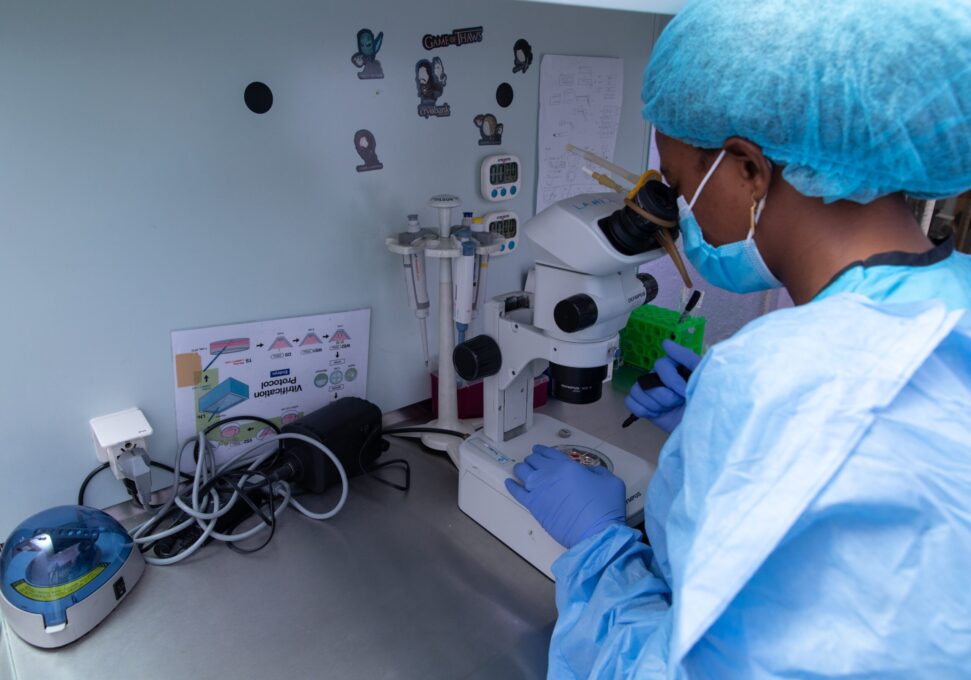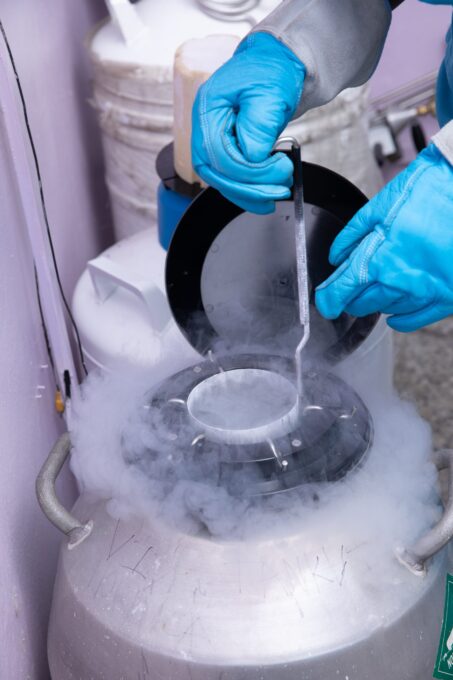Oncofertility
October 6, 2020 2021-04-23 13:17Oncofertility
Oncofertility
October is Breast Cancer Awareness month and breast cancer is the most common type of cancer in Nigeria. We see many young people with breast cancer and fortunately for us, the treatment is getting better, so many of them are actually surviving everything we can do to help them during this major challenge.
Book Appointment
For more information about our Oncofertility services, book an appointment with us.

How Can We Achieve This?
- Bone Marrow treatments and transplant
- Lupus erythematosus
- Myelodysplasia
- Endometriosis
- Fibroids (Repeated Surgery)
Oncofertility Preservation Options
In cancer patients, the fertility preservation method used is usually determined based on advice from the specialists involved. A number of techniques are available, and they can be used individually or together in the same patient to maximize efficiency.
Fertility Preservation Techniques (Male and Female)
Here are fertility preservation techniques used in both male and females:
Female
This involves physically moving the ovaries out of the pelvis through surgical techniques in cases where pelvic radiation is required in order to minimize the damaging effects of ionizing radiation on the ovaries.
Note that this method is not effective in cases that involve chemotherapy treatments.
To cryopreserve (freeze) a woman’s eggs for future fertilization with sperm when she is ready. Hormonal stimulation of the ovaries result in the maturation of multiple eggs that can be harvested by ultrasound guided aspiration and frozen for future use. This process may require 2-6 weeks to complete.
To freeze embryos for future implantation. Hormonal stimulation of the ovaries result in the maturation of multiple eggs that can be harvested and fertilized immediately with her partner’s sperm to create embryos, which are then frozen for future use. This process may require 2-6 weeks to complete.
In this procedure, ovarian cortex or testicular tissue is surgically removed and frozen. This tissue can later be transplanted back into the body and hormonally stimulated to produce eggs and sperm with some success when the patient is ready to conceive. Scientists are currently developing methods to optimize this technique.
This procedure can be carried out for women and men. The genital and pelvic region is shielded with a lead apron during radiation therapy to minimize the damaging effects of ionizing radiation on the ovaries and testes. Note that this is not effective in cases where the cancer treatment involves chemotherapy
Gonadotropin Agonist injections are administered to chemically down-regulate the ovaries or testes and minimize their activity prior to receiving chemotherapy. This method is based on the belief that ovaries and testes with reduced metabolic activity will experience less damage due to chemotherapy. However, there is still some controversy about the beneficial effects of gonadotropin agonist downregulation on future fertility.
Multiple immature eggs are harvested by ultrasound guided aspiration without prior hormone stimulation. These eggs will then be matured in the laboratory either before or after freezing. The main advantage is the relatively short time period required to obtain immature eggs, which minimizes any delay before cancer treatment. Research is still ongoing to develop methods of optimizing the maturation process of eggs in the laboratory.
Male
Cryopreservation of sperm for future use. Multiple semen samples can be collected over a period of several days and frozen.
This is a minor surgical procedure where sperm is retrieved directly from the epididymis or testes and can be frozen for future use. This is only required when no sperm can be produced through ejaculation.
This procedure can be carried out for women and men. The genital and pelvic region is shielded with a lead apron during radiation therapy to minimize the damaging effects of ionizing radiation on the ovaries and testes. Note that this is not effective in cases where the cancer treatment involves chemotherapy
Oncofertility for Pre-Pubertal Cancer Patients
For cancer patients who are yet to attain puberty, ovarian and testicular tissue cryopreservation is usually the preferred method of fertility preservation.
Onco-Fertility Treatments in Nigeria
Currently in Nigeria, various fertility preservation treatments are being offered at Nordica Fertility Centre. If you have been diagnosed with cancer and you need to discuss options available for preserving your fertility before commencing treatments, you can book an appointment to have a consultation with one of our specialists or counsellors. If you are a medical doctor or oncologist who needs to refer a patient for fertility preservation, you can contact us and schedule a discussion with one of our Fertility Preservation experts.
Start your family with us today.
If you’d like to book an appointment or find out more information, get in touch using the contact form or give us a call. We’d love to hear from you.







